2019-2020学年度外研版高中英语选修8Module 4 Which English?课本基础知识课件(19张)
文档属性
| 名称 | 2019-2020学年度外研版高中英语选修8Module 4 Which English?课本基础知识课件(19张) |

|
|
| 格式 | zip | ||
| 文件大小 | 621.3KB | ||
| 资源类型 | 教案 | ||
| 版本资源 | 外研版 | ||
| 科目 | 英语 | ||
| 更新时间 | 2019-03-16 00:00:00 | ||
图片预览

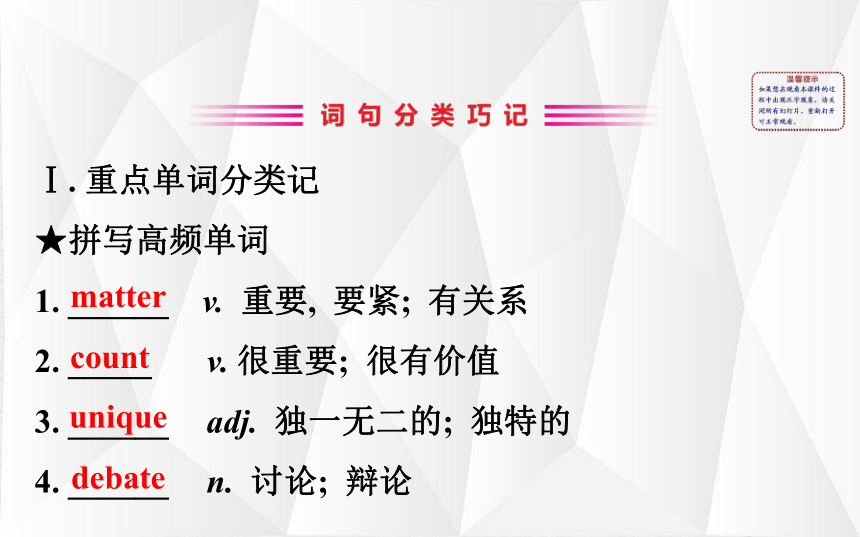
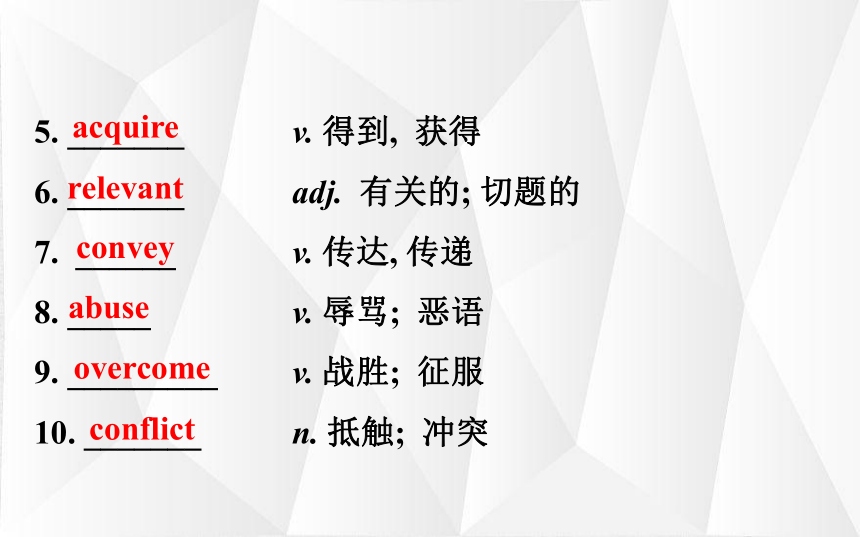
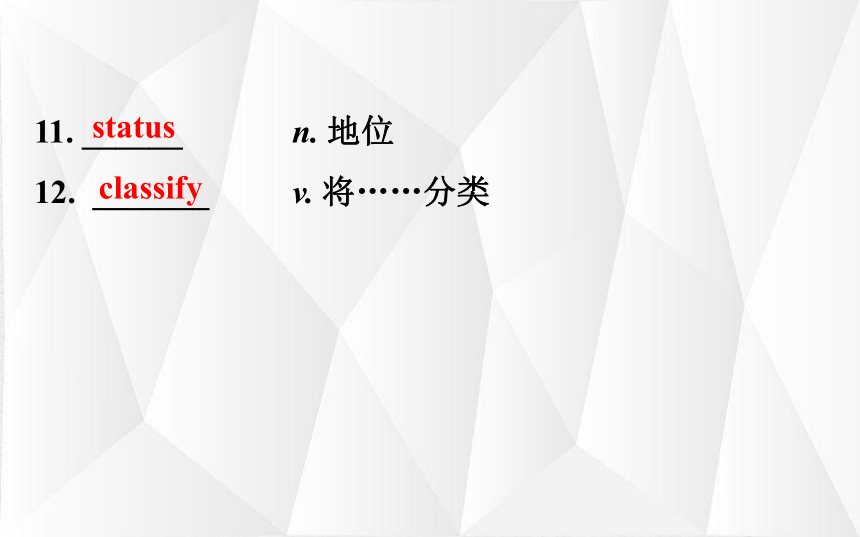
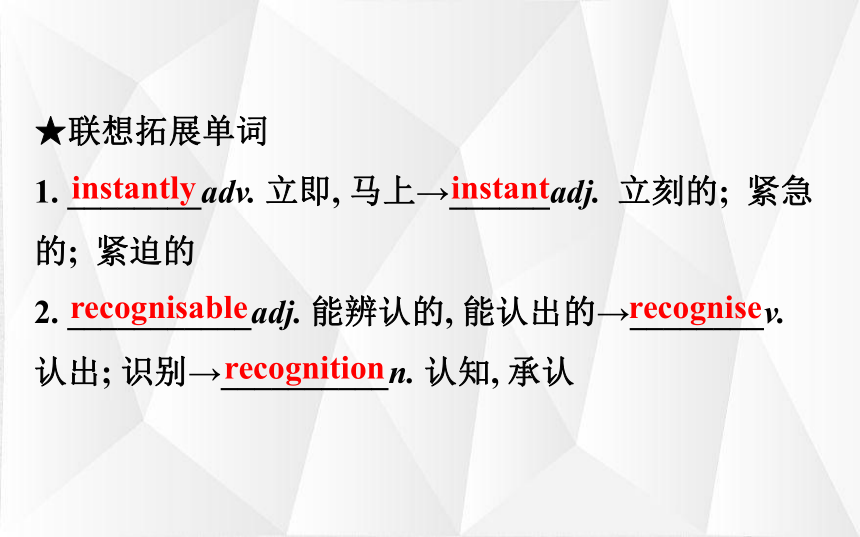
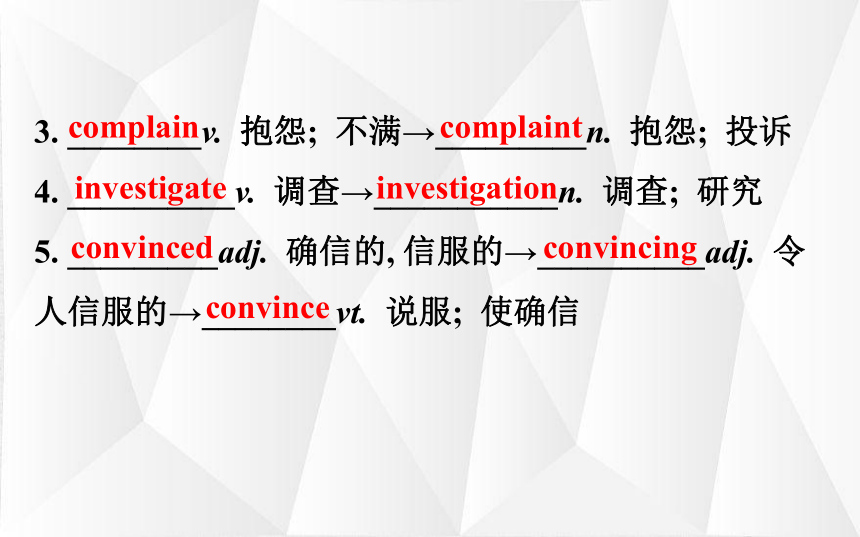

文档简介
课件19张PPT。Module 4
Which English? Ⅰ. 重点单词分类记
★拼写高频单词
1. ______ v. 重要, 要紧; 有关系
2. _____? v. 很重要; 很有价值
3. ______ adj. 独一无二的; 独特的
4. ______? n. 讨论; 辩论mattercountuniquedebate5. _______ v. 得到, 获得
6. _______ adj. 有关的; 切题的
7. ______ v. 传达, 传递?
8. _____ v. 辱骂; 恶语
9. _________ v. 战胜; 征服
10. _______ n. 抵触; 冲突acquirerelevantconveyabuseovercomeconflict11. ______ n. 地位
12. _______ v. 将……分类?statusclassify★联想拓展单词
1. ________adv. 立即, 马上→______adj. 立刻的; 紧急
的; 紧迫的
2. ___________adj. 能辨认的, 能认出的→________v.
认出; 识别→__________n. 认知, 承认instantlyinstantrecognisablerecogniserecognition3. ________v. 抱怨; 不满→_________n. 抱怨; 投诉
4. __________v. 调查→___________n. 调查; 研究
5. _________adj. 确信的, 信服的→__________adj. 令
人信服的→________vt. 说服; 使确信complaincomplaintinvestigateinvestigationconvincedconvincingconvince6. __________n. 联系→________v. 联想; 使联系
→_________adj. 关联的; 联合的
7. __________n. 意义; 含义→_________adj. 重要的;
有意义的
8. _____v. 拒绝接受→________n. 拒绝?
9. ______v. 反对→________adj. 对面的; 反对的?associationassociateassociatedsignificancesignificantrejectrejectionopposeopposite10. _____v. 反抗; 抵抗→_________n. 反抗; 对抗
→________adj. 反抗的; 抵抗的; 顽固的
11. ________n. 赞许; 赞成→________v. 赞成; 同意
12. ________n. 好奇; 好奇心→_______adj. 好奇的
→________adv. 好奇地resistresistanceresistantapprovalapprovecuriositycuriouscuriously13. __________n. 着迷, 迷恋; 吸引力→________v.
使着迷→_________adj. 着迷的; 被深深吸引的
14. _____v. 选择; 挑选→________n. 选择; 挑选fascinationfascinatefascinatedselectselection★识记阅读单词
1. trace n. __________
2. ancestor n. __________
3. link n. _____
4. straightforward adj. ______________?
5. absurd adj. ______________痕迹, 踪迹祖先, 前辈联系简单的, 易懂的荒唐的, 荒谬的6. concept n. __________
7. clumsy adj. _______
8. withdraw v. ___________________
9. furthermore adv. __________
10. splendid adj. ______________
11. potential adj. ______________概念; 观念笨拙的收回; 撤销(说过的话)此外, 而且极好的; 优秀的潜在的; 可能的12. offence n. ______________
13. prejudice n. __________
14. candidate n. ______________得罪; 使伤感情偏见; 歧视投考人, 应考人Ⅱ. 重点短语快速记
1. ___________ 区分开
2. _________ 只要?
3. _____ 在于?
4. ____________ 总而言之; 总之?
5. ________________ 大量的?tell. . . apartas long aslie inin conclusiona huge number of6. ______________ 开始做某事?
7. ___________ 使某人失望?
8. ________ 同意; 达成一致?
9. ____________ 与……有关?
10. ________ 更确切地说; 倒不如说
11. _______________ 与……有所不同?
12. ________________ 有……的趋势/倾向??get down to sth.let sb. downagree onbe relevant toor ratherbe different fromhave a tendency toⅢ. 经典句式应用记
1. In this sense everybody’s use of language—________
___________________________(不论是英语、汉语还是
任何其他语言)—is different. (whether. . . or. . . 引导并
列成分)?whetherEnglish, Chinese, or any other2. ________________(据估计)1. 3 billion people will use
English as either a first or a second language by 2050. ?
(It is +过去分词+that. . . )
3. ____________(并不是所有的习语)have been
common for many years. (not 与all连用表示部分否定)?It is estimated thatNot all idioms4. English has a huge number of colourful and splendid
expressions ________________________________(这些
可能会难以理解). (主语+be+adj. +不定式)?
5. Perhaps correctness doesn’t matter— _________
speakers can understand each other—____
communication ____counts. (as long as引导的条件状语
从句; it is. . . that强调句型)?which may be difficult to understandas long asit’s that1. All roads lead to Rome. 条条大路通罗马。
2. A bird is known by its note and a man by his talk. 闻其歌知其鸟, 听其言知其人。
3. We have really everything in common with America nowadays, except of course, language.
如今我们和美国在各方面都相同, 当然除了语言。4. It doesn’t make much of a difference whether a teacher speaks British or American English.
老师讲英式英语和美式英语没有太大差别。
Which English? Ⅰ. 重点单词分类记
★拼写高频单词
1. ______ v. 重要, 要紧; 有关系
2. _____? v. 很重要; 很有价值
3. ______ adj. 独一无二的; 独特的
4. ______? n. 讨论; 辩论mattercountuniquedebate5. _______ v. 得到, 获得
6. _______ adj. 有关的; 切题的
7. ______ v. 传达, 传递?
8. _____ v. 辱骂; 恶语
9. _________ v. 战胜; 征服
10. _______ n. 抵触; 冲突acquirerelevantconveyabuseovercomeconflict11. ______ n. 地位
12. _______ v. 将……分类?statusclassify★联想拓展单词
1. ________adv. 立即, 马上→______adj. 立刻的; 紧急
的; 紧迫的
2. ___________adj. 能辨认的, 能认出的→________v.
认出; 识别→__________n. 认知, 承认instantlyinstantrecognisablerecogniserecognition3. ________v. 抱怨; 不满→_________n. 抱怨; 投诉
4. __________v. 调查→___________n. 调查; 研究
5. _________adj. 确信的, 信服的→__________adj. 令
人信服的→________vt. 说服; 使确信complaincomplaintinvestigateinvestigationconvincedconvincingconvince6. __________n. 联系→________v. 联想; 使联系
→_________adj. 关联的; 联合的
7. __________n. 意义; 含义→_________adj. 重要的;
有意义的
8. _____v. 拒绝接受→________n. 拒绝?
9. ______v. 反对→________adj. 对面的; 反对的?associationassociateassociatedsignificancesignificantrejectrejectionopposeopposite10. _____v. 反抗; 抵抗→_________n. 反抗; 对抗
→________adj. 反抗的; 抵抗的; 顽固的
11. ________n. 赞许; 赞成→________v. 赞成; 同意
12. ________n. 好奇; 好奇心→_______adj. 好奇的
→________adv. 好奇地resistresistanceresistantapprovalapprovecuriositycuriouscuriously13. __________n. 着迷, 迷恋; 吸引力→________v.
使着迷→_________adj. 着迷的; 被深深吸引的
14. _____v. 选择; 挑选→________n. 选择; 挑选fascinationfascinatefascinatedselectselection★识记阅读单词
1. trace n. __________
2. ancestor n. __________
3. link n. _____
4. straightforward adj. ______________?
5. absurd adj. ______________痕迹, 踪迹祖先, 前辈联系简单的, 易懂的荒唐的, 荒谬的6. concept n. __________
7. clumsy adj. _______
8. withdraw v. ___________________
9. furthermore adv. __________
10. splendid adj. ______________
11. potential adj. ______________概念; 观念笨拙的收回; 撤销(说过的话)此外, 而且极好的; 优秀的潜在的; 可能的12. offence n. ______________
13. prejudice n. __________
14. candidate n. ______________得罪; 使伤感情偏见; 歧视投考人, 应考人Ⅱ. 重点短语快速记
1. ___________ 区分开
2. _________ 只要?
3. _____ 在于?
4. ____________ 总而言之; 总之?
5. ________________ 大量的?tell. . . apartas long aslie inin conclusiona huge number of6. ______________ 开始做某事?
7. ___________ 使某人失望?
8. ________ 同意; 达成一致?
9. ____________ 与……有关?
10. ________ 更确切地说; 倒不如说
11. _______________ 与……有所不同?
12. ________________ 有……的趋势/倾向??get down to sth.let sb. downagree onbe relevant toor ratherbe different fromhave a tendency toⅢ. 经典句式应用记
1. In this sense everybody’s use of language—________
___________________________(不论是英语、汉语还是
任何其他语言)—is different. (whether. . . or. . . 引导并
列成分)?whetherEnglish, Chinese, or any other2. ________________(据估计)1. 3 billion people will use
English as either a first or a second language by 2050. ?
(It is +过去分词+that. . . )
3. ____________(并不是所有的习语)have been
common for many years. (not 与all连用表示部分否定)?It is estimated thatNot all idioms4. English has a huge number of colourful and splendid
expressions ________________________________(这些
可能会难以理解). (主语+be+adj. +不定式)?
5. Perhaps correctness doesn’t matter— _________
speakers can understand each other—____
communication ____counts. (as long as引导的条件状语
从句; it is. . . that强调句型)?which may be difficult to understandas long asit’s that1. All roads lead to Rome. 条条大路通罗马。
2. A bird is known by its note and a man by his talk. 闻其歌知其鸟, 听其言知其人。
3. We have really everything in common with America nowadays, except of course, language.
如今我们和美国在各方面都相同, 当然除了语言。4. It doesn’t make much of a difference whether a teacher speaks British or American English.
老师讲英式英语和美式英语没有太大差别。
